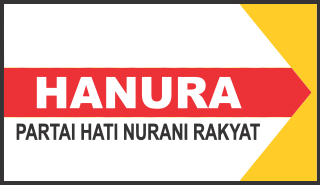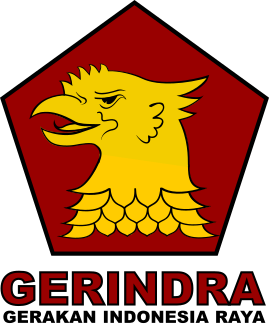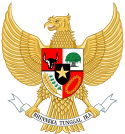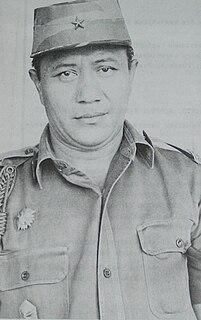
The politics of Indonesia take place in the framework of a presidential representative democratic republic whereby the President of Indonesia is both head of state and head of government and of a multi-party system. Executive power is exercised by the government. Legislative power is vested in both the government and the two People's Representative Councils. The judiciary is independent of the executive and the legislature.

The Indonesian Democratic Party of Struggle is an Indonesian political party, and the party of the current President of Indonesia, Joko Widodo.

The United Development Party is an Islam-based political party in Indonesia. Due to its distinctive logo, the party is nicknamed "Kaaba Party".

Elections in Indonesia have taken place since 1955 to elect a legislature. At a national level, Indonesian people did not elect a head of state – the president – until 2004. Since then, the president is elected for a five-year term, as are the 560-member People's Representative Council and the 128-seat Regional Representative Council.

The Indonesian Democratic Party (PDI) was one of the two state-approved parties during the New Order era of the late 20th-century in Indonesia.

The National Mandate Party, frequently abbreviated to PAN, is an Islam-based political party in Indonesia.

The Crescent Star Party is a political party in Indonesia.
The Indonesian Justice and Unity Party is a political party in Indonesia.
This is a timeline of Indonesian history, comprising important legal and territorial changes and political events in Indonesia and its predecessor states. To read about the background to these events, see History of Indonesia. See also the list of Presidents of Indonesia.

Indonesia's sixth legislative election, and the fifth under the New Order regime, was held on 9 June 1992. Although the share of the vote won by Golkar declined, and the two parties saw their votes rise, the government organisation still won a clear majority.
Kopkamtib (Indonesian: Komando Operasi Pemulihan Keamanan dan Ketertiban or "Operational Command for the Restoration of Security and Order", was a secret police operation in Indonesia's "New Order" that continued issues arising from the transition to the New Order.

The People's Conscience Party is a political party in Indonesia. It was established following a meeting in Jakarta on 13–14 December 2006 and first headed by former Indonesian National Armed Forces commander Wiranto.

The Great Indonesia Movement Party is a political party in Indonesia. In the 2014 presidential election, the party was represented by former Indonesian Army Strategic Reserve Command and Indonesian special forces commander Lieutenant General Prabowo Subianto. Prabowo lost to Joko Widodo in the election, earning 46.85% of the vote to Widodo's 53.15%.

The Berkarya Party is an Indonesian political party formed in 2016. The party is led by the youngest son of former president and dictator Suharto, Hutomo Mandala Putra. Better known as Tommy Suharto, he is a convicted murderer by proxy. Berkarya is one of 16 political parties eligible to contest Indonesia's 2019 general election. The party is supporting Tommy's former brother-in-law Prabowo Subianto for the presidency in 2019.

The Garuda Party is a political party in Indonesia that will contest the 2019 general election. The party been linked to the family of former president Suharto. Officials have denied the party is linked to the Suharto family or to former general Prabowo Subianto's Gerindra Party.
Parmusi was a political party in Indonesia. It was established in 1968, came fourth in the 1971 Indonesian legislative election, winning 5.36% of the vote and 24 seats in the legislature, and in 1973 was obliged by the New Order regime to join other Islamist parties and fuse into the United Development Party.


















